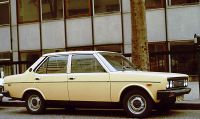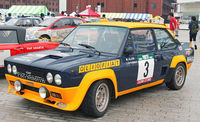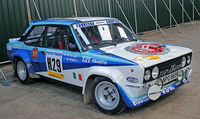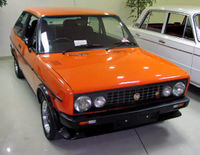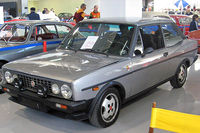Fiat 131
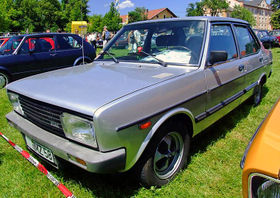 1979 Series II Fiat 131 Super Mirafiori 1979 Series II Fiat 131 Super Mirafiori
| |
| Fiat 131 | |
|---|---|
| Aka | Fiat Mirafiori Fiat SuperMirafiori Fiat Brava |
| Manufacturer | Fiat |
| Assembly | Comprensorio di Mirafiori, Turin, Italy Bogotá, Colombia |
| Production | 1974–1984 |
| Predecessor | Fiat 124 |
| Successor | Fiat Regata |
| Class | Small family car |
| Layout | FR layout |
| Body style | 4-door saloon 2-door saloon 5-door estate |
| Engine | straight-4 |
| Transmission | 4 and 5-speed manual 3-speed automatic |
| Wheelbase | 2490 mm |
| Length | 4231 to 4264 mm |
| Width | 1644 to 1651 mm |
| Height | 1381 to 1411 mm |
| Weight | 950 to 1145 kg |
| Fuel capacity | 50 L |
| Related | SEAT 131 Tofaş Şahin Tofaş Murat 131 Tofaş Dogan Tofaş Kartal (estate) |
| Designer | |
The Fiat 131, additionally called "Mirafiori", is a small/medium family car produced by the Italian car manufacturer Fiat from 1974 to 1984. It was exhibited at 1974 Turin Motor Show.
The 131 was the replacement for the successful Fiat 124, and available as a 2-door and 4-door saloon and 5-door estate. The 131 was given the Mirafiori name after the Turin suburb where the cars were produced. Naming the car in this way marked a break with the former Fiat convention, established in the 1960s, of naming their mainstream models only with a three digit number, and it set the pattern for Fiat to adopt Anglo-American style car naming practice, with carefully chosen names for subsequent new models. The 131 was marketed as Fiat Brava in United States. Initially, the 131 was offered with 1.3 L and 1.6 L single overhead camshaft engines. Revisions were made in 1978 and 1981, and all models were produced until production ceased in 1984.
1,513,800 units total were produced in Italy.
The Fiat 131 Abarth was a very successful rally car, winning the World Rally Championship three times: in 1977, 1978, and in 1980 with Markku Alen, Timo Salonen and Walter Röhrl at the wheel. The official "works" cars were sponsored by Italian airline Alitalia and bore their distinctive red, white and green livery.
Construction and technology
The Fiat 131 employed construction techniques and technologies typical of its day. The body was a monocoque type, made of conventional steel. Designed and styled on the typical "three-box" design, with distinct boxes for the engine compartment, passenger compartment, and boot.
The major mechanical components were also conventional and contemporary, but with some notable advances. In basic terms, the 131 employs a front engine, rear-wheel drive layout, whereby the engine is mounted in the front of the car, longitudinally in a north-south orientation. The gearbox is mounted directly behind the engine, and a tubular propeller shaft, under the transmission "tunnel", transmits the drive to a solid live rear axle.
The engines were all straight-4 types, derived from the engines used in the outgoing 124 range, with a cast iron cylinder block and aluminium alloy cylinder head, either pushrod with chain drive camshaft or double (DOHC) overhead camshaft, driven by a single rubber/kevlar toothed timing belt. Fuel supply was via a single Weber ADF twin-choke carburettor, fed from a trunk mounted steel fuel tank. Traditional contact breaker ignition systems were used, usually with Marelli distributors.
The suspension system utilised fully independent front suspension, with MacPherson struts, track control arms and anti-roll bar. The rear suspension was quite advanced (when using a solid live rear axle), in that the rear axle was controlled by double unequal length trailing arms and a panhard rod, with coil springs and direct acting dampers. This design proved far superior to many of its contemporaries, especially with vehicle stability and handling.
The braking system was also typical; the front brakes were disc brakes, using a solid iron disc and a single-piston sliding caliper. The rears were drum brakes, utilising leading and trailing shoe design operated by a dual piston fixed slave cylinder. They were operated hydraulically, with a tandem master cylinder assisted by a vacuum servo using two separate circuits. A rear mounted load sensing valve varied the bias of effort applied to the rear brakes, dependent on the load being carried (and also the pitch dynamics caused by braking effort and road levels). A centrally located floor mounted handbrake operated on the rears using bowden cables.
Series 1
Initially the 131 came with 1297 cc or 1585 cc straight-4 ohv engine. The first series was available with two body styles; saloon and estate Familiare. There were two trim levels - the basic "131" and the better appointed "131 S" or "131 Special", which could be distinguished from the base model by its 4 circular headlamps, chrome window surrounds and different instrumentation. In 1976, 500 examples of Fiat 131 Abarth Rallye were built for homologation purposes. This car included many technical modifications such as 16-valve DOHC engine producing 140 PS, Kugelfischer mechanical fuel injection and independent rear suspension. In race specifications, the engine produced around 215 PS in season 1977.
| Model | Displacement | Engine type | Power |
| Mirafiori | 1297 cc | straight-4 ohv | 65 PS |
| Mirafiori | 1585 cc | straight-4 ohv | 75 PS |
| Familiare | 1297 cc | straight-4 ohv | 65 PS |
| Familiare | 1585 cc | straight-4 ohv | 75 PS |
| Abarth | 1995 cc | straight-4 dohc | 140 PS |
Series 2
The 131 got a minor facelift in 1978. New DOHC, or "Twin Cam" (TC) engines arrived, and these models were badged as SuperMirafiori. Biggest change exterior wise was larger rectangular shaped front lights, new bumpers, new bigger rear lights and new interior trim. In 1978, the 2-door sporting version Racing (Mirafiori Sport in the UK) with 115 PS DOHC engine, was launched. This car had four round headlights (the inner headlights being smaller than the outer ones (unlike any other mirafiori model produced)), different grille, spoilers and extended wheel arches, and a short-throw 5 speed gearbox. The Racing had top speed of 180 km/h. Diesel engined versions also had four round headlights (equally sized). The Familiare (estate) was renamed as Panorama.
| Model | Displacement | Engine type | Power |
| Mirafiori | 1301 cc | straight-4 ohv | 65 PS |
| SuperMirafiori | 1301 cc | straight-4 dohc | 78 PS |
| SuperMirafiori | 1585 cc | straight-4 dohc | 96 PS |
| Panorama | 1301 cc | straight-4 ohv | 65 PS |
| Panorama | 1585 cc | straight-4 ohv | 75 PS |
| Diesel | 1995 cc | straight-4 | 60 PS |
| Diesel | 2445 cc | straight-4 | 72 PS |
| Racing | 1995 cc | straight-4 dohc | 115 PS |
Series 3
The 131 was updated again in 1981. Production of the Racing/Sport versions ceased, although these were sold well into 1982. The same 2.0 TC (twin cam) engine went to the SuperMirafiori. The car was renamed 131 Super Brava in Australia. The car received a slightly updated interior (instruments, single-piece glovebox lid), whilst lower rubbing strips found their way onto all models up to CL specification. The SuperMirafiori received larger lower door cladding. Mechanically, some new SOHC engines (1.4 & 1.6), new clutch, gearboxes, and tweaked suspension were also introduced. In the same year, was also introduced new sport version Volumetrico Abarth, with 2 litre engine equipped with Abarth designed supercharger.
In 1983 the production of saloon version was discontinued, but the estate named now as 131 Maratea was produced with two engine choices 2.0 TC (115 PS) and 2.5D (72 PS) until 1985, and replaced then with Regata Weekend. These last versions featured 4 round headlights and the by-now familiar 5-bar grille.
| Model | Displacement | Engine type | Power |
| Mirafiori | 1367 cc | straight-4 sohc | 70 PS |
| Mirafiori CL | 1585 cc | straight-4 sohc | 85 PS |
| SuperMirafiori | 1367 cc | straight-4 dohc | 75 PS |
| SuperMirafiori | 1585 cc | straight-4 dohc | 97 PS |
| SuperMirafiori | 1995 cc | straight-4 dohc | 115 PS |
| Panorama | 1301 cc | straight-4 ohv | 65 PS |
| Panorama | 1585 cc | straight-4 sohc | 85 PS |
| Diesel | 1995 cc | straight-4 | 60 PS |
| Diesel | 2445 cc | straight-4 | 72 PS |
| Volumetrico Abarth | 1995 cc | straight-4 | 140 PS |
Spanish twin
Up to 1982, Spanish SEAT cars were all exact re-badged twins of Fiat models. The Spanish version of the 131 was called the SEAT 131, and was sold and produced in Spain, but only in 4-door bodies. The SEAT factories also produced the estate version of the car (called 131 Panorama) for export purposes, but these were badged with Fiat emblems.
Turkish twin
Tofaş industries in Turkey also based their initial production on Fiat 131s built under Fiat license. 131-based models included the Murat 131 built in Bursa, Turkey, the Doğan, Şahin and the Kartal (the estate). These vehicles enjoyed a very long production run and were later replaced by newer Fiat models.
Other producers
The Fiat Tofaş 131 was also produced in Egypt by El Nasr, on the basis of complete knockdown (CKD) kits since 1991 and in Ethiopia by Holland Car since 2006.
External links
| <- Older Models | Fiat car timeline, European market, 1980s - present | |||||||||||||||||||||||||||||||||||||||
| Type | 1980s | 1990s | 2000s | 2010s | ||||||||||||||||||||||||||||||||||||
| 0 | 1 | 2 | 3 | 4 | 5 | 6 | 7 | 8 | 9 | 0 | 1 | 2 | 3 | 4 | 5 | 6 | 7 | 8 | 9 | 0 | 1 | 2 | 3 | 4 | 5 | 6 | 7 | 8 | 9 | 0 | 1 | 2 | 3 | 4 | 5 | |||||
| City cars | 126 | Cinquecento | Seicento (1998-2005) / 600 (2005-2010) | |||||||||||||||||||||||||||||||||||||
| 500 | ||||||||||||||||||||||||||||||||||||||||
| Panda I | Panda II | |||||||||||||||||||||||||||||||||||||||
| Supermini | 127 | Uno | Punto I | Punto II | ||||||||||||||||||||||||||||||||||||
| Grande Punto | Punto Evo | |||||||||||||||||||||||||||||||||||||||
| Small family car |
Ritmo | Tipo | Bravo / Brava | Stilo | Bravo II | |||||||||||||||||||||||||||||||||||
| 131 | Regata | Tempra | Marea | Linea | ||||||||||||||||||||||||||||||||||||
| Albea | ||||||||||||||||||||||||||||||||||||||||
| Large family car | 132 | Argenta | Croma I | Croma II | ||||||||||||||||||||||||||||||||||||
| Coupé | Coupé | |||||||||||||||||||||||||||||||||||||||
| Roadster | 124 Spider | Barchetta | Barchetta | |||||||||||||||||||||||||||||||||||||
| Sports car | X1/9 | |||||||||||||||||||||||||||||||||||||||
| Panel van/Leisure activity vehicle | Fiorino I | Fiorino II | Fiorino III | |||||||||||||||||||||||||||||||||||||
| Doblò | ||||||||||||||||||||||||||||||||||||||||
| Mini SUV | Sedici | |||||||||||||||||||||||||||||||||||||||
| Mini MPV | Idea | |||||||||||||||||||||||||||||||||||||||
| Compact MPV | Multipla | |||||||||||||||||||||||||||||||||||||||
| Large MPV | Ulysse I | Ulysse II | ||||||||||||||||||||||||||||||||||||||
| Van | Daily* | Scudo I | Scudo II | |||||||||||||||||||||||||||||||||||||
| Ducato I | Ducato II | Ducato III | ||||||||||||||||||||||||||||||||||||||
| Mini Pickup | Strada | |||||||||||||||||||||||||||||||||||||||
| Off-road | Campagnola (1107) | |||||||||||||||||||||||||||||||||||||||
| *Rebadged Iveco model | ||||||||||||||||||||||||||||||||||||||||
| <- Previous Fiat car timeline, European market, 1960s-1980s Next -> | ||||||||||||||||||||||||||||||||||||||||||||||||||
|---|---|---|---|---|---|---|---|---|---|---|---|---|---|---|---|---|---|---|---|---|---|---|---|---|---|---|---|---|---|---|---|---|---|---|---|---|---|---|---|---|---|---|---|---|---|---|---|---|---|---|
| Type | 1960s | 1970s | 1980s | |||||||||||||||||||||||||||||||||||||||||||||||
| 0 | 1 | 2 | 3 | 4 | 5 | 6 | 7 | 8 | 9 | 0 | 1 | 2 | 3 | 4 | 5 | 6 | 7 | 8 | 9 | 0 | 1 | 2 | 3 | 4 | 5 | 6 | 7 | 8 | 9 | |||||||||||||||||||||
| City car | 500 | 126 | ||||||||||||||||||||||||||||||||||||||||||||||||
| 600 | 133 | Panda | ||||||||||||||||||||||||||||||||||||||||||||||||
| Supermini | 850 | 127 | Uno | |||||||||||||||||||||||||||||||||||||||||||||||
| Small family car | 1100 | 128 | Ritmo | Tipo | ||||||||||||||||||||||||||||||||||||||||||||||
| 1300 | 124 | 131 | Regata | |||||||||||||||||||||||||||||||||||||||||||||||
| Large family car | 1500 | 125 | 132 | Argenta | Croma I | |||||||||||||||||||||||||||||||||||||||||||||
| Executive car | 2300 | 130 | ||||||||||||||||||||||||||||||||||||||||||||||||
| Coupé / Roadster | Dino / 124 Sport Spider | 124 Sport Spider | ||||||||||||||||||||||||||||||||||||||||||||||||
| 124 Coupé | ||||||||||||||||||||||||||||||||||||||||||||||||||
| Sports car | 850 Spider | X1/9 | ||||||||||||||||||||||||||||||||||||||||||||||||
| Panel van | Fiorino I | Fiorino II | ||||||||||||||||||||||||||||||||||||||||||||||||
| Compact MPV | 600 Multipla | |||||||||||||||||||||||||||||||||||||||||||||||||
| Van | 600 T | 850 T | 900 T | |||||||||||||||||||||||||||||||||||||||||||||||
| 1100 BLR / ELR / I / T | 238 | |||||||||||||||||||||||||||||||||||||||||||||||||
| 241 | 242 | |||||||||||||||||||||||||||||||||||||||||||||||||
| Daily* | ||||||||||||||||||||||||||||||||||||||||||||||||||
| Ducato I | ||||||||||||||||||||||||||||||||||||||||||||||||||
| Off-road | Campagnola (1101) | Campagnola (1107) | ||||||||||||||||||||||||||||||||||||||||||||||||
| *Rebadged Iveco model | ||||||||||||||||||||||||||||||||||||||||||||||||||
